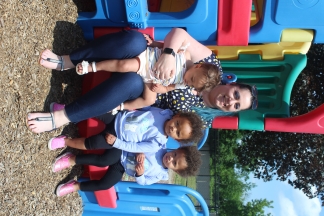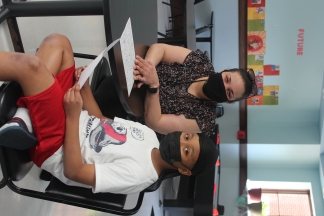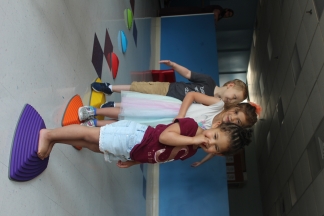news article
Good Neighbors The Neighborhood Center in Utica, New York, walks the path with children, seniors and immigrants.
July 23, 2021 / By Mary Beth Coudal
Editor's note: This article is a preview of a story to appear in the September/October 2021 issue of response magazine, the magazine of United Methodist Women. It features the Neighborhood Center, a community outreach organization located in Utica, New York, supported by both Upper New York and United Methodist Women. United Methodist Women is the official women's organization of The United Methodist Church and the largest denominational faith organization for women with hundreds of thousands of members across the country and partners around the world. You can purchase the upcoming issue and subscribe at unitedmethodistwomen.org/response.
“Walking the path with our neighbors” is how Sandra Soroka describes the work of the Neighborhood Center. And there are as many paths and ways of walking with neighbors as there are facets to this longtime community gem in Utica, New York.
Over the past year, the center struggled to keep essential activities open for families, children, and people in need. The center’s leaders, particularly Soroka, the executive director, were guided as always by the center’s original mission: to support folks with mental health issues, children in need of care and new immigrants settling into a new neighborhood and culture.
For years, Utica, a hardscrabble town on the Erie Canal, once a stop on the manufacturing corridor, has seen a decline in population. Until recently, the overall population was decreasing by about one percent a year. Located between Syracuse and Albany, Utica residents are hoping for a renaissance through the public-private “Nano Utica” initiative, making the region a hub for nanotechnology. The pandemic slowed this progress.
Growth has occurred incrementally with the arrival of new citizens. The region has been a destination for new Americans originally born in Russia, Bosnia, Burma, and Somalia. Around 19 percent of the approximately 60,000 Utica residents were born in a different country.
Thanks to the resettlement of refugees, the area has become increasingly multicultural. In one recent swearing-in ceremony, 30 refugees from 15 countries became U.S. citizens in Utica. Economically, the median income has risen slightly to $35,394, and the poverty rate remains a stubborn 30 percent. The neighbors who are struggling with poverty, young children, and mental health are the families that the Neighborhood Center, a United Methodist Women-supported national mission institution, has always served. The center is also supported by the Upper New York Conference as an Advance special.
Methodist hospitality
The center began as the Italian Settlement House in 1905 by six Methodist women who helped Italian immigrants complete their naturalization papers. These women of the Woman’s Home Missionary Society procured six rooms in a two-story building for their work and expanded from there. In addition to sharing their faith with new immigrants, the women also taught life skills. For example, in 1952, 670 adults received training for new vocations at the center.
The center’s name was changed in 1945 from the Italian Settlement House to the Neighborhood Center. A playground was built. A child for whom a building was eventually named, Marie Russo, became the center’s fifth director.
“The thing I remember most about the first time that I went to the Settlement House was the unusual experience of being loved, unconditionally,” Russo recalled in The House on Mary Street: The Early Years by Kathryn Hartz Beard. “I can’t really explain it. The Settlement House was a place you could go and feel valued, loved, and no one ridiculed you for having ‘foreign ways.’ And I was not exactly the kind of kid who was easy to love. I didn’t trust anybody, and I certainly did not believe them when they said they cared about who and what I was.”
For the first time in her life, Russo experienced many of life’s joys, including friendship and a hot shower.
“It was a refuge from the poverty and sorrow we all lived in,” she said.
The Neighborhood Center made it possible for young, old, and new Americans to survive and even thrive. The center continues to live out this radical inclusiveness, even when the community feels divided.
“In today’s environment, we have such extremes and such strong beliefs,” Soroka said.
The center brings people together, regardless of their political leanings. Soroka found herself on the receiving end of verbal abuse when, during the presidential election, she asked several senior citizens to remove campaign signs that they had affixed to the Neighborhood Center’s signs. Because the center is a polling place, this level of promotion for a candidate was illegal.
The antidote, as Soroka sees it, is to fully embrace the “open hearts, open minds, open doors,” promise of The United Methodist Church. This mindset, she says, invites everyone to be a part of the solution.
Children persevering
Just as many of the United Methodist Women-connected national mission institutions, the Neighborhood Center has been hit hard during the pandemic. Early on, Soroka recommitted the work of the center to its earliest mission and legacy: childcare. Following the U.S. Centers for Disease Control and Prevention guidelines, the center transitioned to a hybrid model of learning, continuing to advocate for children and families who depend on the center for school, afterschool, and early childcare.
According to 12-year veteran childcare worker Janett Davila, who works with the youngest school-age children, “The kindergartners have persevered.”
The children enjoyed being together, even at a distance, at the North Community Center, an outpost of the downtown Neighborhood Center. Fifth grader Frankie prefers to learn in person rather than the hybrid online learning model in which he attended his classes from the community center. Mia, a second grader, who sat near Frankie, agrees.
As the students learned together on their separate devices in their disparate virtual classes, they were all in the same vast room, a bit of social interaction in an otherwise solitary learning environment. About once a month, the center offered a fun, socially distanced event for the students to socialize, according to the former Head Start teacher and current Division Director Patrice VanNortwick.
“We are losing quality childcare left and right,” Soroka said. She points out that for an average family who makes an income of $30,000 to $40,000, the $10,000 cost for early childcare is prohibitive. Sabrina Lamie, the interim childcare director at the northside location, is looking for new ways to recruit children who may have fallen away from organized schooling, to invite the families to return to preschool and
afterschool.
As more families fall into cycles of poverty, there are fewer opportunities to lift themselves out. The Neighborhood Center staff has had to make tough decisions. In the first month of 2021, the center lost $53,000 due to the pandemic as they fulfilled required staff quarantines and witnessed a reduction in income from programs. One program that was cut was the Circles Campaign, an innovative approach to entrenched poverty that reveals the hidden rules of society and fosters a mutuality of benefit across classes in society.
At the North Community Center location, the center is poised to reopen the senior daycare services. The staff of the Neighborhood Center looks forward to its 380 seniors returning. The seniors often socialize with the children at the joint childcare center for holiday parties.
According to VanNortwick, who works with the refugee health program and leads the children’s program, the diversity of programs and people is part of the center’s strengths.
“I’ve always loved different cultures. Why would you want to be with someone who is just like you?” she said.
As a child, Betty Youmans, a former Mohawk District United Methodist Women officer, took cooking classes and played on the Neighborhood Center playground.
“Growing up, the Neighborhood Center was part of my life.” In fact, her mother served on the board for 25 years.
Because Youmans remembers her childhood joy upon receiving Christmas gifts from the volunteers at the Neighborhood Center, as an adult, she donated 10 sleeping bags to the center, thinking the children who attend the nearby Methodist camp could use them. Instead, she learned that the sleeping bags were one of the only blankets some of the recipients owned, and they used them year-round.
Youmans encourages fellow United Methodist Women members to directly support the center and other United Methodist Women-connected mission institutions with their finances. And as the center reopens for programming, in-person volunteers will also be needed.
Support for mental health
The Neighborhood Center also offers an Adult Recovery Services program focusing on mental health. Soroko marvels at the clients’ “creativity, artistry and intelligence.” Part of the program’s work is to reduce the stigma attached to mental illness.
“A brain disorder is not a lot different than a heart disorder,” Soroka said.
Through her work at the center and as a member of the board at the nearby NAACP in Rome, Soroka has also seen the toll of racism on people. Racism triggers mental health
One recipient of mental health support is JoAn (who asked to be identified only by her first name). JoAn, an 86-year-old with a master’s degree in microbiology and a former avid tennis player, felt extremely lonely during the pandemic. She needed help with panic attacks and depression.
“Sometimes the void is great,” she said. She was advised to reach out to the Neighborhood Center, which provided help and healing. She calls the support she received from her therapist Heather “a wonderful service.”
A community that cares
“It’s exactly what it says it is: a neighborhood center,” said JoAn.
There are many stories like JoAn’s, of neighborliness and healing during the pandemic from this Utica community center. Some examples include donations of seven laptops to children who needed them for remote learning, support for 10 months of sobriety for a young person overcoming addiction, safe housing for a young man with suicidal ideations and meal delivery to a homebound 68-year-old.
While the path ahead for many of the approximately 90 community centers connected to United Methodist Women like the Neighborhood Center is not without challenges, the neighbors who lead and guide these centers are continuing to pave a better way for all, despite the divisions of society or the budget shortfalls. Drawing on its history, the Neighborhood Center, just as the kindergartners in Davila’s care, persevere.
Mary Beth Coudal is a writer and teacher in New York City. This story will appear in the September/October 2021 Issue of response magazine, the official magazine of United Methodist Women, unitedmethodistwomen.org/response. Tara Barnes, editor of response, is a member of the Upper New York Conference.

